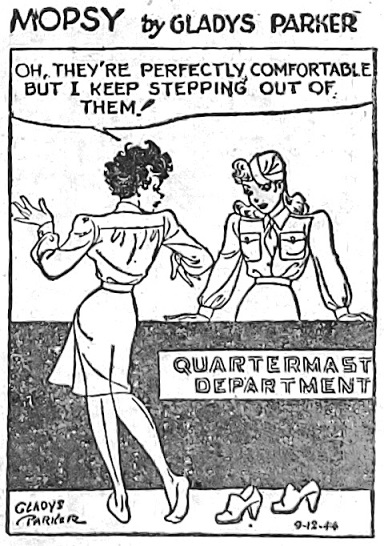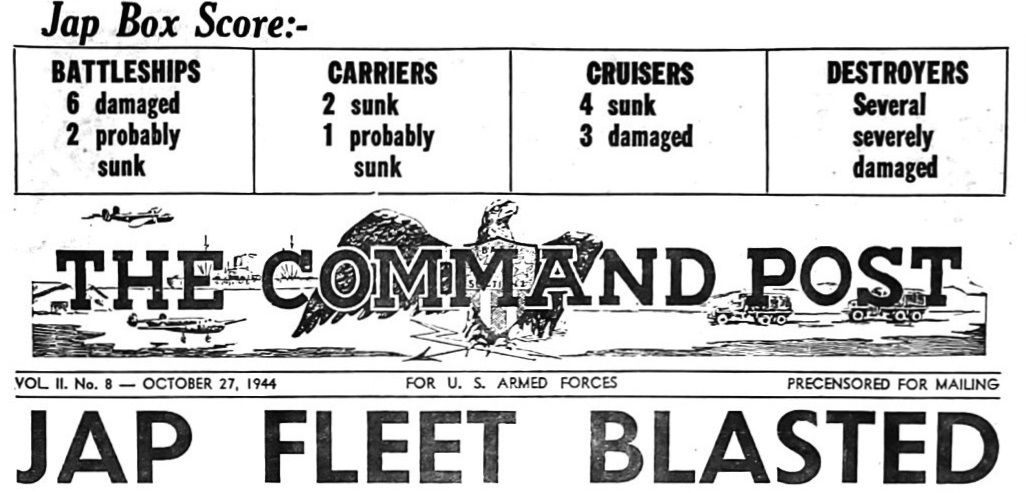
JAP LINES IN CBI AIR RAIDS KANDY Oct. 26 - No important change is reported in the general situation on the Chin Hills and Arakan fronts, says today's SEAC communique. Air - Ammunition dumps and enemy positions on the Arakan front were bombed yesterday by aircraft of Eastern Air Command. On October 24 attacks on communications destroyed or damaged engine sheds, locomotives, rolling stock, railway lines and bridges. Widespread damage to enemy communications was inflicted by U.S. Mitchells of Eastern Air Command on October 24. They caused a large explosion and left fires burning at Monywa, main rail base for Japanese supplies along the lower Chindwin where the waterfront and other targets were bombed. Further east they attacked the railway between Maymyt and Lashio, wrecking locomotives, rolling stock and installations and destroying a bridge south of Hsumhsai. U.S. Thunderbolts fired a gasoline dump and damaged warehouses, rolling stock and bashas in the Meza area. nbsp; Delayed reports from the North Burma front show that the Tenth Air Force Thunderbolts on Sunday and Monday knocked out four bridges and for the second successive day hit a bivouac area south of Indaw on the Mogaung-Mandalay railway. |
DEFEAT’ - MACARTHUR
PEARL HARBOR, Oct. 26 - Adding emphasis to the "most crushing defeat of the war," Admiral Chester Nimitz's communique issued here today placed Jap losses in the sea and air battle now raging in the Philippines and the Sibuyan Sea at two aircraft carriers, four cruisers sunk and two battleships and one large carrier probably sunk. Six battleships, three heavy cruisers and several destroyers were also severely damaged.
The communique added that there was no damage to American ships.
Significantly, Nimitz said that these losses were still incomplete, indicating that announcements of still more destruction to the Japanese fleet were in the offing.
Most of the Jap losses occured in the battle south-east of Formosa.
National Broadcasting correspondent Gordon Walker, in a broadcast from the Philippines today, stated: "Navy spokemen here claim that practically every major ship with the exception of carriers in the aJapanese Navy has been either sunk or damaged."
Walker added: "At one time the Japanese Fleet got within 20 miles of Leyte beach. It waqs a narrow squeak.
"The battle is not over and the entire Pacific war hinges on this fight. If the American Navy comes out on top, it may be that the war will be shortened by as much as a year.
"American carriers beat off the thrust from the north through sheer heroism, though outnumbered."
General MacArthur in a special statement yesterday on the communique broadcast from Field Press Headquarters at Leyte, said, "The Japanese fleet has suffered the most crushing defeat of the war."
A Japanese southern force comprising two battleships, one heavy cruiser, one light cruiser and four destoyers has been completely routed, says a special communique from Leyte.
President Roosevelt stated yesterday that the Japanese navy had been "defeated, seriously damaged and routed in the Philippines." The statement was given to reporters at a special conference in Washington.
Admiral Ernest King stated yesterday (Wednesday) that nearly all of the Japanese fleet is taking part in the Pacific battle. At least one of three divisions of the Japanese fleet had been turned back as it moved towards the central Philippines but it might return, he added.
OMURA BOMBED IN B-29 RAID
HEADQUARTERS XX BOMBER COMMAND - B-29s of the XX Bomber Command Wednesday attacked the Omura Kyushu Island, Japan. The attack was carried out in daylight by a medium force from the XX Bomber Command bases in China.
Omura is an aircraft assembly, repair and training installation on the east coast of Omura Bay, 12 miles northeast of Nagasaki, and adjacent to the Omura Naval Air station. Of modern design, the plant was built by Japan during the present war as one of the keystones of her air power. It comprises some 75 buildings and is large by any standard of comparison for aircraft production and engine maintenance.
The Superfortresses met some fighter resistance in Wdnesday's raid, and experienced moderate anti-aircraft fire over the target. The weather was clear with the result that the bombing was accompished in complete visibilty, and the crews were able to observe their results, which they characterized generally as "good." One of our aircraft is missing.
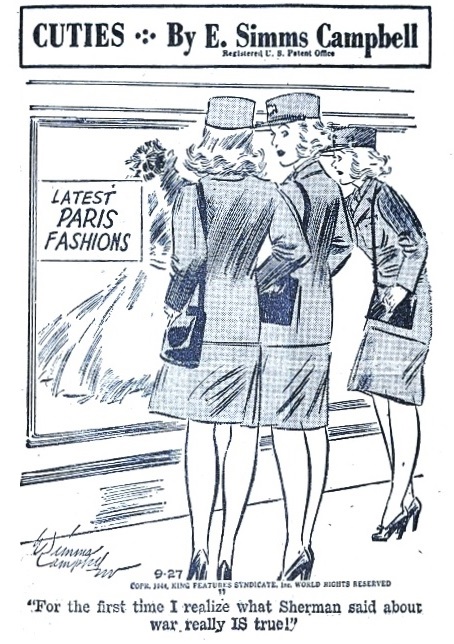
|
‘Super’ Mess Hall Opened At Maidan
Probably the finest GI mess hall in the CBI Theatre was officially opened last Sunday afternoon at Maidan Camp, by Major Gen. G. X. Cheves. Members of Hq. Co. Base Section No. 2 and their guests sat down to the first meal of chicken, mashed potatoes, corn, cake and other sweets served by Mess Sergeant Keimit Rinker and his staff of chefs.
The new mess hall is decorated with murals from nearly every State in the Union. Each picturization shows some characteristic of the particular State. The work was done by S/Sgt. Lawrence Shoemrock of Neenah, Wis., and his staff artists. Individual tables, seating four, are another feature of the new mess. Colorful table cloths and curtains add to the fine appearance.
Maidan camp, has progressed in the past months to a model U.S. Army installation in this Theatre. Under the command of Major H. L. Decker of Richmond, Ind., with Lt. Harry Johnson, Staten Island, N.Y., and Lt. William McHugh, Melrose, Mass., as company officers, the camp has undergone a constant expansion and face-lifting, with numerous new barracks, a shower room, day room, Post Exchange and motion picture theatre being added.
The grand opening was preceded by a tea dance at the company recreation tent, attended by a large audience of civilian and Allied guests. S/Sgt. James Lambert of Sweetwater, Tex., acted as Master of Ceremonies.
Commenting of his visit to the camp, General Cheves said "The Officers and Enlisted Men of Headquarters Company deserve a great deal of credit here for using their ingenuity in building this fine mess hall without the expenditure of Government funds."
Overseas 21 Years; Finally Going Home
ATC BASE, INDIA - He lay back on his charpoy in the transient barracks at the ATC station in the northwest corner of India and in his eyes was a far-away look. He was a little man; his head had long since turned a steel grey. He was dreaming dreams.
Lying there with only the thatch roof above him. he could shut his eyes and see the slow moving tugs in the North River, the way the skyline of Manhattan looms up in the early morning mist, and hear the lonely sound of the fog horns in the evening.
T/Sgt. Joseph Diskin, 46, a combat infantryman, could lay there and dream of many things. For the ATC was going to take him home - for the first time in 25 years. Home to Hoboken, New Jersey. To some it might be only a city of loft factories and coal sooted docks, a butt for second rate night club emcees' jokes. But it was home, and a soldier can dream.
When you speak of the "old soldier," meaning those professional Army men who wore the OD's before the threat of Nazi tyranny swept upon the world, you are speaking of men like Sgt. Diskin. He enlisted in the last war and served in France with the 29th Division in such campaigns as St. Meheil, Muese-Argonne, and others. There he won the Purple Heart.
|
When the war was over he stayed in the Army and in 1920 he went to Panama for five years of duty. Then to the Philippines with the infantry for ten years. From the Philippines he went to Hawaii and he was there at Scofield Barracks on Dec. 7, 1941, when the Japs pulled their sneak punch on Pearl Harbor. From Hawaii he went to the Christmas Islands in the Southwest Pacific and helped to establish a U.S. outpost there along our vital supply routes to Australia. In May 1943, he went back to the States briefly but on arrival he found they were recruiting men for a special task in Burma - Merrill's Marauders.
He promptly joined and was hustled off for special training and had no time to sneak in a visit to Hoboken. When Merrill and his men starteed their famous 700 mile march through the Burma jungle, Diskin went along as a platoon sergeant. He was through all the bloody campaigns up and down the length of the march, climaxed by the battle for the Myitkyina airport. He lost 40 pounds during the campaign.
All told he has had 21 years of overseas duty. He has been overseas 30 months in World War II. He draws 40% fogle pay and has only three more years to go before he is eligible for retirement. Despite all this he is anxious to head out again for overseas once he has had a furlough back home.
"That's where I belong, I guess," he said. "I have an argument with them every time because of my age, but I am hoping my luck will hold out again."
The last time he was in Hoboken was in 1919. His mother still resides there at 923 Park Avenue. He finished giving the facts about himself. A soft spoken, courteous soldier. A fighting man.
And then he leaned back on his bed, closed his eyes again and thought of how Hoboken would look in October. The trees would be turning their leaves into bright fall colors in the smoky little parks. The docks would be hustling with the wartime activity the beer in the taps of the taverns would be cold; the people would be arguing back and forth about Roosevelt and Dewey.
Yes, it would be good to get home again.
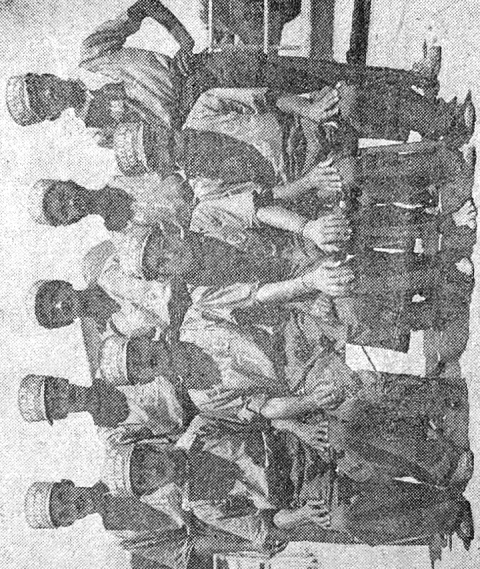 Just in case you never saw a wooden Indian here are the Skp Caps, members of the baggage wallas' Local No. 1 at an ATC Base, APO 882, India. Sky Caps insisted on being posed like this. P.S. They accept tips. (ATC photo)
Just in case you never saw a wooden Indian here are the Skp Caps, members of the baggage wallas' Local No. 1 at an ATC Base, APO 882, India. Sky Caps insisted on being posed like this. P.S. They accept tips. (ATC photo)
|
ATC ‘SKY CAPS’ GLORY
ATC BASE, INDIA - The aerial port of entry into CBI, already a terminal comparable to many in the States, has taken one more step in resemblance to Grand Central with the coming of the 'Sky Caps.' These bustling baggage wallas, first ATC personnel to meet incoming Very Important People, are dressed to kill with kindness. Their flamboyant uniform consists of red shirts labeled "ATC" and bearing the walla's number, navy blue slacks, and trim WAC-like billed caps which carry a legend telliong what it's all about.
The Sky Caps are brain children of Major John M. Clifford, former Service Officer. Orders reurning the major to Uncle S., however arrived here before the bearers' Cinderella-clothes and so he's never seen them in their sartorial glory.
The colorful get-up went to some of the boys' heads at first - they didn't like the idea of going to sleep at night without their bright suits on. So it became necessary to check the outfits in at night and keep them at the field - regrettably leaving the Sky Caps, shorn of their radiance, to go home to their dwellings as just plain laymen.
The photog who shot them in their Police-Gazette-formation (the postures were assumed at their insistence) seized the opportunity to interview two Sky Caps who struck him as typical men-in-the-reet-pleats.
First deponent said his name is Ramranh Bux (spelling uncertain). A resident of a nearby large village, he believes that hs is twenty-five and that he has two children, a boy and a girl. His colleague, Mohamed Husain, has four children, and announced that he is bus fineesh. He was born in a tent city not far from the field, has never been more than five miles from it, and expects to die in it. His age, he thinks is 42.
Both Ranramh and Mahamed hold that "it's teek, teek, teek to be in a uniform."
"All aboard for Burma and China" might well be the battle-cry of an Assam Air Depot of the Northern Area Service Command from which originate the operational supplies for fighting air squadrons in those countries. At this "Grand Central of aircraft supply," the work of hundreds of Air Force and SOS supply technicians and agencies comes to a head, and sinews of war are issued, monitored to need by GI "expressman" before being turned over to ATC and other pilots for delivery. The following pictures tell a flash story of improvisation in the tea gardens of lush Assam. |
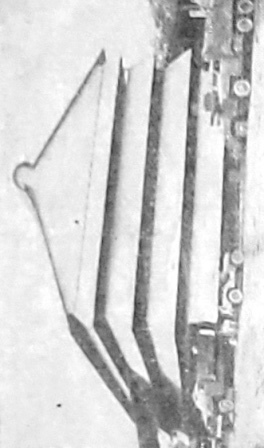 THE TEA LEAVES DIDN'T PREDICT
THE TEA LEAVES DIDN'T PREDICTA former tea 'factory' from which Air Service Command supplies are monitored, is now the scene of more activity than its builders even dreamed possible. |
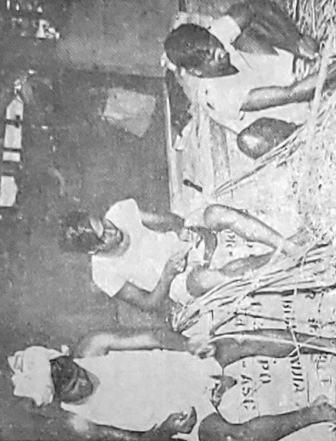 WHITTLERS
WHITTLERSAssamese laborers cutting bamboo thongs for light wrapping of crates and boxes. |
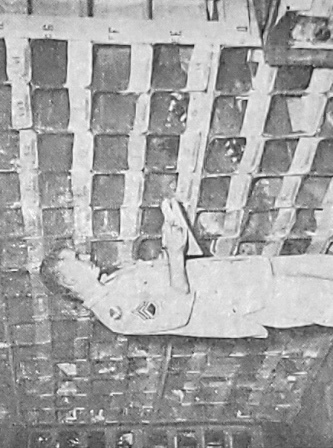 YANKEE IMPROVISATION
YANKEE IMPROVISATIONS/Sgt. Thomas H. Andrews of Leavenworth, Kan., checking on stocks kept in home-made tin bins. |
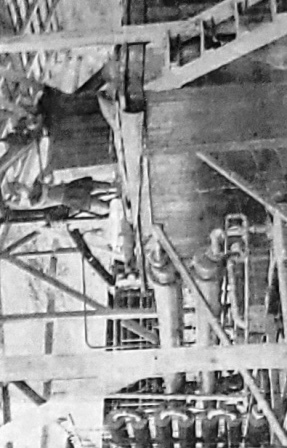 STATESIDE MOTORIST'S DREAM
STATESIDE MOTORIST'S DREAMThere is not a nail in this tire storage basha which is made of bamboo and tarpauli9n. |
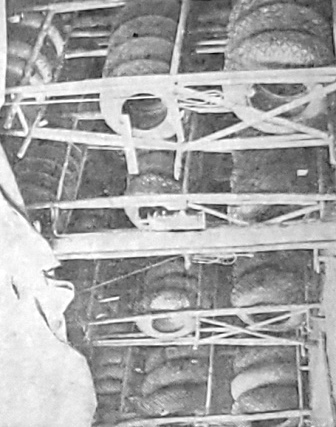 MAZE OF TUBES AND TANKS
MAZE OF TUBES AND TANKSThe collection of tubes and tanks was once an Italian air-cooled ice machine. It was converted into a water-cooled unit by T/Sgt. Charles E. Hankes (back of block mold). At left is Hankes' helper, Pfc. John Luchitz. Plant makes ice for Valley hospitals and storage of film and medical stock. (ASC photos) |
|
Luxurious EM Club Opened At ATC Base ATC BASE, INDIA - Personnel of this India China Division ATC base had "fun for free" the other night at a celebration attendant to the formal opening of the new Enlisted Men's Club. There was plenty of cold beer and "coke" on the house and the boys munched sandwiches at the club for supper - the mess hall was closed. Lt. Col. Charlie F. Skannal, station CO, and Maj. Russell B. Langley, executive officer, in brief speeches, turned the club over to the enlisted men, and Lt. N. Robert Wellens, special service officer and "father" of the project, helped officiate at the house-warming. The base orchestra, the Skyline Patrol, furnished the music. The club is housed in a large brick building with the first floor given over to lounging and writing facilities and a snack bar on the second floor. |
|
Hallowe'en Dance On Monday At Rec Center Amidst Jack-O-Lanterns, witches, black cats, corn stalks and all the traditional trimmings, the ARC will officially open its Fall dancing season with an open-air Hallowe'en dance on Monday, October 30th, at the new Army recreational center at 3 Outram Street. Elaborate plans are under way to make the occasion a huge success. Admission to the dance will be, as usual, by invitation only, and invitations to the affair have been sent out to eight of the local Army installations. Girls interested in attending the dance may secure an invitation by calling the American Red Cross, Cal. 6250, and one will be mailed promptly. Refreshments will be served at the dance. Music will be supplied by the 'Jive Bombers.' On Tuesday evening, October 31st, a Hallowe'en Spook Party will be held in the game rooms of the Burra Club. All the usual games will be held, and pumpkin pie and coffee is promised. |
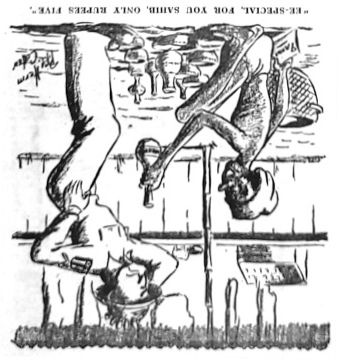
|
Monkeys Nearly Halt
ATC Church Service
HQ., ICD ATC, INDIA - Even a chapel isn't immune to monkey business, Lt. Col. Paul W. Schrope, India China Division, ATC chaplain, learned Sunday when he conducted services for this base.
It all started during the hymn singing. Chaplain Schrope noticed some sly chuckling. In fact some members of his flock obviously looked as if they were enjoying a comedy, instead of a worship service. Then he glanced out of the corner of his eye and spied the seat of the merriment.
Atop a door at one side of the chapel was a monkey who stayed just long enough to hear a hymn. Then he hopped to a ladder outside. A second later he was back with Mama and they both perched in the archway above a window, They peered down at the would-be worshippers as if the chapel-goers might have been the monkeys. Then one became bold and hung by one hand from the doorway, looking for all the world as if his next leap would take him to the keyboard of the organ which T/Sgt. Walter Lendh, Brockton, Mass., was playing.
Lendh was spared any musical competition when both monkeys disappeared momentarily - only to reappear hanging from the eaves at the opposite side of the building. Apparently religion left the hairy pair a little cold, because they went away before the start of the sermon, so that Chaplain Schrope no longer had to vie with the star performers for the congregation's attention. The chaplain later smiled:
"I didn't know whether to ignore the visitors or try to chase them away. If I had tried to chase them, they probably would have thought I wanted to play, and we never would have got rid of them."
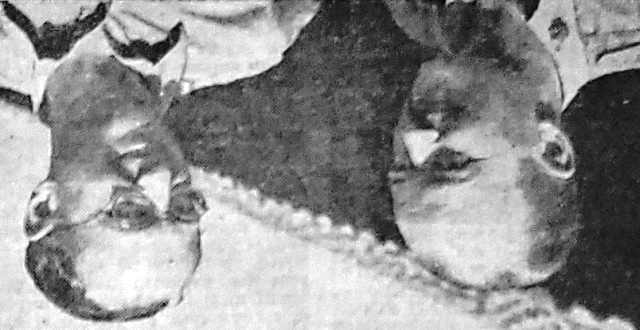 After years of conversing together over their radio telephones, Major Frank Breen, San Jose, California (left) and S/Sgt. Pat Gould, Minneapolis, Minn. (right) finally met face to face at a local General Hospital. (Signal Corps photo)
After years of conversing together over their radio telephones, Major Frank Breen, San Jose, California (left) and S/Sgt. Pat Gould, Minneapolis, Minn. (right) finally met face to face at a local General Hospital. (Signal Corps photo)
|
Something new in the "I-met-him-in-CBI" stories came in this week. S/Sgt. Pat Gould, Minneapolis, Minnesota, not only met somebody, he met a man that he has known for six years but had never met before. It happened when he met Major Frank Breen, dental officer, San Jose, California, at the General Hospital, and thereby hangs a tale.
It seems that Gould and the Major are both radio "hams." They both had sending and receiving sets in civilian life, and in the course of his radio activity Gould had picked up Breen one day years ago and they struck up a radio conversation. Soon their families were in on the conversations, and they became fast, though invisible, friends. Believe it or not, this went on for six years, and the two friends never quite got together.
Came his 'greetings' and Gould went into the Army, and in the course of time arrived in the CBI. One day recently, at the hospital for a minor ailment, Gould glanced on the bulletin board and saw a name that struck a familiar chord, 'Major Frank Breen, dental officer.' He dashed down to the dental office, made himself known, and lo and behold it was his radio pal of years standing.
|
New Fathers Feted At Jewish Services Lt. Lionel Gilman of Detroit, and Pfc. Ned Edelman of Chicago, who both recently became fathers on the same day, will entertain Jewish servicemen, as well as a group of other friends, Friday night after the regular Jewish services at the Maghen David Synagogue. After the traditional Jewish custom, special prayers are said for newborn children, and Chaplain David Seligson will officiate for Lt. Gilman and Pfc. Edeleman on the occasion. Friends of both the men are invited to attend. |
|
Chaplain Seligson On ‘Chaplain’s Hour’ Capt. David J. Seligson, Jewish Chaplain, will be the guest speaker on the Chaplain's Hour on Suinday evening at 18:00 hours, it was announced by the program director at Station VU2ZU. Each week at this time VU2ZU presents the Chaplain's Hour, which is specifically aimed toward those in the hospitals, or in a position where religious services are not available. A guest speaker representing the various faiths is invited to speak each week, and a male choir supplies the musical background. Chaplain Seligson, who speaks this week, is the assistant Base Chaplain representing the Jewish faith. |
|
Latter Day Saints Meeting Next Week The Base Chaplain's office announced a meeting of all members of the Chuirch of Latter Day Saints next week. The conference will be held in the assembly tent at the Maidan camp, beginning on Saturday, Nov. 4th, at 2 p.m. Additional meetings will be held Sunday, Nov. 5th, at 10 a.m. and 2 p.m. in the tent, and at 7 p.m. in the mess hall at Hq. building. Mr. Ralph M. Davey of Chicago is now in the Theatre, and will be in charge of the conferences. |
|
Lt. Col. Vincent Sheean went to register for voting in N.Y. Because in other years Col. Sheean has been out of the country at election time, working as a foreign correspondent all over the world, this is the first time he is voting.
The registration clerks insisted that despite his Lieutenant Colonelcy he had to take a literary test to prove that he could read and write. So Sheean went to P.S. 59 and took the test.
There the famed correspondent and author of such best sellers as "Personal Hoistory," "Not Peace But the Sword" and others was given a certificate which he will frame - a certificate attesting that "Vincent Sheean is able to read and write."
Sheean was recently in the CBI on a public relations tour.
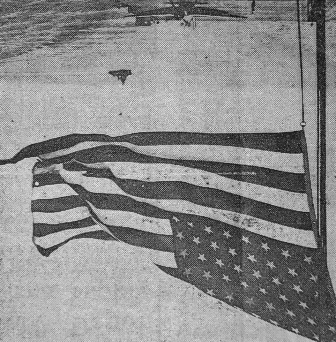 IN THE PHILIPPINES
IN THE PHILIPPINESUnfurling in a stiff breeze, the flag of the United States floats over the flight deck of a Navy aircraft carrier. A watchful destroyer follows the curving wake of the carrier and a plane that has just landed can be seen on the deck. |
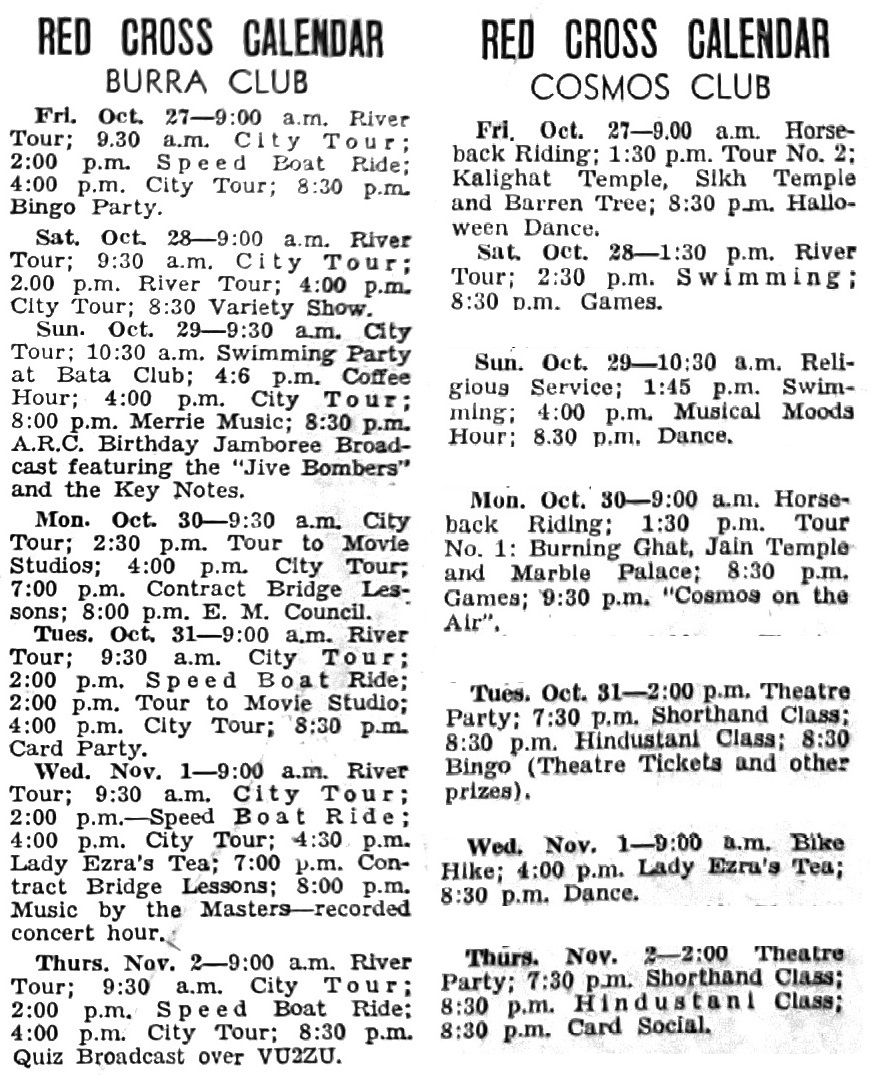
|
| Third Week’s Play Brings Upsets In Softball Loops |
|
AMERICAN LEAGUE The rumor has reached this desk that the MPs won Sunday and are still tied for the top in the American League, but in the only two game scores that were turned in, the strong Pathfinders team, that lost a heart-breaker last week, got back in their winning stride and knocked off the Tigers 5-1, and the Rajah's murdered the Millers 11-0. NATIONAL LEAGUE In the National League, the Photo-Jo's maintained their undefeated stride when they scored seven runs in the first three innings to beat the Generals 8-4; the Tornadoes flattened the Brass Hats 15-0; the Flambombs spun the Rotators 7-3; and the Sea Mulers pushed around the Kids 10-6. TOLLLY LEAGUE Wild pitched ahutout ball (although that may sound like double-talk) and allowed only three hits as the Stevedores tamed the Wildcats 4-0 in the Tolly League. Only 22 batters faced Wild over the 7-inning route. In the other game in the four-team Tolly Loop, the Yankees beat the Porters 4-3. Lollar, the Yanklees pitcher, won his own game in the last half of the seventh with a single driving in the winning run. ALLIED LEAGUE In the Allied League, the leaders are still knotted up, as Sunday the Dozers continued to win beating the Redbirds 3-1, and the Stevedores bagged the Wildcats 14-4. The Ramblers bowed to the Guardians 4-1 and the Leafs McLean pitched his second shutout in three weeks as the Canadian boys subdued the Parkers 10-0. In the fifth game the Navy made it three losses in a row for the Sad Sacks when they trampled them 7-2. |
|
FEDERAL LEAGUE They renamed the Bush League the Federal League, but even the shearing of the apparently objectionable name didn't have any effect in making the scores come in. However the Bernath's are definitely in the league, for their score arrived for the third week. Scoring in every inning but the sixth, they rolled up 16 runs to beat the Dum Dums 16-0. Aronson Wins All-India Table Tennis BOMBAY - Herbert (Chubby) Aronson, touring exhibition table tennis star, became the new All-India Table Tennis champion when he beat V. R. Sivaraman, the Madras champion, in three straight games Saturday night in the finals of the men's single championships at Xavier College Hall in Bombay. Aronson had little trouble with the Madras paddleman, takingv him in straight games, 21-10, 21-12, and 21-10. Aronson combined with Nathan Steele in the finals of the men's double, but after winning the first two games, a great come-back by D. H. Kapadia (Bombay) and M. V. S. Vithal (Mysore) beat them out. Steele was erratic in the last three games as the Indian combine won 21-23, 16-21, 21-17, 21-11 and 21-19. |
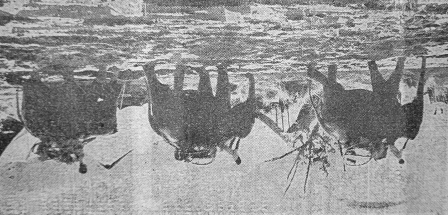 BURMA HEAVIES
BURMA HEAVIESEn route to a railhead which supplies troops on the Burma front, three elephants plod along a muddy road. Pacyderm transportation and labor are used extensively on the jungle front. Tents made from dropped parachutes are in the background. |
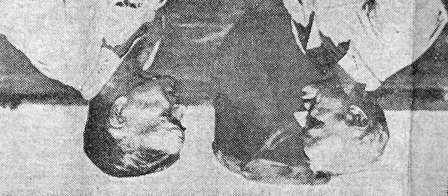 U.S. NAVAL CHIEFS
U.S. NAVAL CHIEFSOn the deck of a U.S. warship, Admiral Chester W. Nimitz, commander-in-chief of the U.S. Pacific Fleet confers with Admiral William F. Halsey, Jr., right, commander in the South Pacific. U.S. Naval forces are engaged in a major battle with the Japanese fleet. |
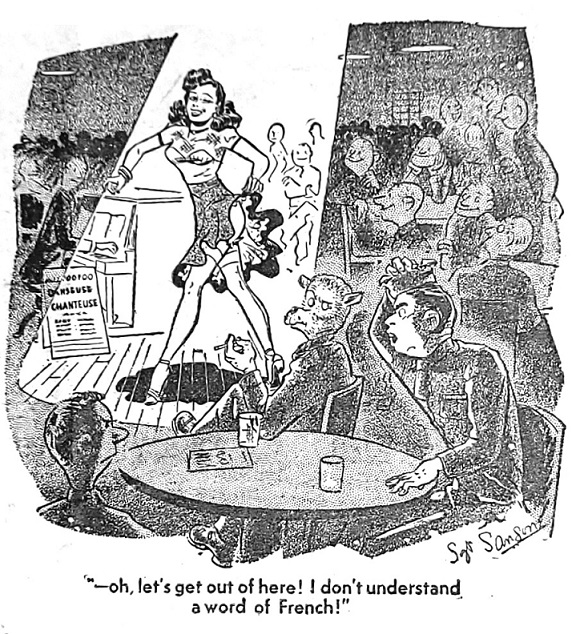
|
T/7 Hank Gould
TRUE LOVE COMES TO LIGHT
ON A DARK ROMANTIC NIGHT
"I don't care if it was a First Lieutenant, or even a Second Lieutenant, that Arabella went out with," I told Abdul, "she's still two-timing me." I thought that it was about time time I laid down the law. Treat 'em rough and they come back for more. That's going to be my motto from now on. I was goig to do just that too, 'til I remembered that Arabella's brother, Omi Ghosh, was a professional wrestler.
I just laid there in my charpoy thinking of what to do next, while Abdul went out to tend to the victory garden. I'll go see Arabella and find out what the score is. No, I'll get stinkin' drunk and have a good time. No, I'll see Arabella. No, I'll get drunk. This went on for fifteen full minutes until Abdul came running up to me with a letter in his hand. "Is that for me?" I asked. He said. "Yes, Sahib. And smell." I wonder who it could be from? It couldn't be from my gal back home. I already have my letter for this month from her. Then Abdul piped up with, "One good way of finding out Sahib, is to - "I know - I know. I'm opening it up now."
As my fingers went nervously around the letter trying to open it up, Abdul just stood there with a satisfied grin on his face puffing on one of my cigarettes. I aske him why in the heck he had that silly satisfied look, and he said, "Oh, that's because I smoke Chesterfields." At a time like this, is one of my most trying moments, at a time when I get a letter, he has to start giving out with humor.
"Oh happy day!" Reward come to he who waits. (An old Hindu saying) Just think! Someone really read my column last week, and my
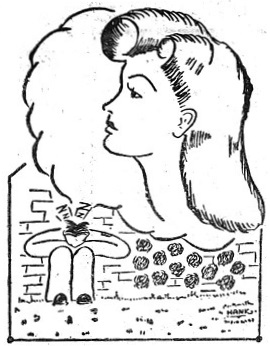
|
I told him to be quiet and not to make fun of my sugar reports. I cleared my throat and started again, "At last you are free to become all mine. Please meet me at the left end of the main cow paddy wall in the Ballygunge district. I will be there at ten o'clock sharp." The letter was signed, "Your true love." I began wondering whet she looked like. Who knows, she may even look like a million - every day of it too. But then again, she may be a nice streanline model.
I started getting all 'duded up' and put on some of the best talcum powder that the First Sgt had. I was dressed and on my way in less time then it takes for a Personnel Officer to get paid. Abdul stood at the door and wished me luck. He said, "Be good and if you can't be good, be careful and if you can't be careful, mell . . . (Remember when your grandmother used to tell you that one?)
I passes about five cow paddy walls but I knew that they weren't the main ones by the smell. I finally got to the right one and looked at Abdul's alarm clock that I brought along. It was only one o'clock. Gee, an hour to waste! I sat down against a part of the wall that hadn't been used and dozed off to dreamland.
What a dream! There she was, the girl whose picture I once saw in LIFE magazine. She was beautiful. And she was in love. Yes. with me. (Well it was only a dream). We went on a picnic. Just the two of us. Eats, beer and a beautiful girl. What more could a guy ask for? She took my hand and held it in hers.
JUst then I woke up. There was someone holding my hand. What a shape and what a - "Hello." she said. I couldn't see her face, but the voice sounded like a female SINATRA. She must be an angel. I must still be dreaming.
Just then a GI truck came by and the lights shone in her face. Now I could see her face and it wasn't the same girl I saw in LIFE Magazine.
I let go of her hand and started running. And Buddy, what running I did. I ran so fast that an Air Corps Officer almost picked me up for flying low. I got back to the barracks in no time flat.
Abdul wasn't there in the usual manner, to greet me and ask how I made out. He must have had something to do with this.
As I stood by the wash basin, washing my hands, a question kept rolling over and over in my mind. How in the heck did Paddy Cake Annie ever learn how to read and write?
|
PRIVATE FIRST CLASS Ance L. Yount, Okay, Oklahoma Theodore S. Bestfelt, Cincinnati, Ohio Edwin J. Mann, Evansville, Indiana Herve J. Marquis, Providence, Rhode Island Joseph E. Bogenschutz, Cincinnati, Ohio Carl H. Harnaday, Pearcy, Arkansas Otus M. Hopson, Altheimer, Arkansas PRIVATE TO TECHNICIAN FIFTH GRADE Clarence W. Baker, Newark, New Jersey Joseph L. Rogers, Jr., New York City, New York Paige A. King, Norfolk, Virginia Lois C. Stewart, Dallas, Texas Joe Ashmore, Los Angeles, California Isaac Walker, Miami, Florida Hamblen Ward, Jr., Canton, Mississippi Wilbur M. Roland, Jacksonville, Florida Albert W. Raynard, Magnolia, Delaware Ira Bolden, Cincinnati, Ohio Frank R. Brown, Beaver Falls, Pennsylvania Harold Brooks, Dayton , Ohio |
|
|
|
Herbert C. Banks, Guion, Arkansas PRIVATE TO TECHNICIAN FOURTH GRADE PRIVATE FIRST CLASS TO TECHNICIAN FIFTH GRADE Robert Floyd Adams, Cincinnati, Ohio Granville Wood, Hedley, Texas Robert A. Dunn, Cleveland, Ohio PRIVATE FIRST CLASS TO CORPORAL Robert A. Falcon, Monrovia, California Wilbur D. Hortman, Sommerdale, Ohio Bob M. Higginbotham, Williford, Arkansas Paul Szrutt, Hammond, Indiana |
|
TO CORPORAL CORPORAL TO TECHNICIAN FOURTH GRADE TECHNICIAN FIFTH GRADE TO TECHNICIAN FOURTH GRADE David E. Laird, Sheldon, Illinois Ward A. Longsdon, Toledo, Ohio Verlin E. Ledbetter, Lawndale, California Robert E. Carter, Chicago, Illinois Thomas F. Cook, Checotah, Oklahoma Basil A. Hawkins, Jamaica L.I., New York CORPORAL TO SERGEANT Joseph E. Stedding, Baltimore, Maryland |

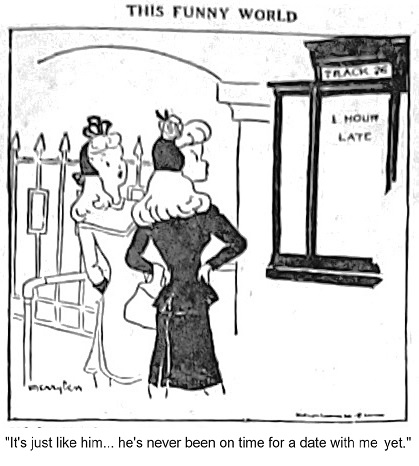
|
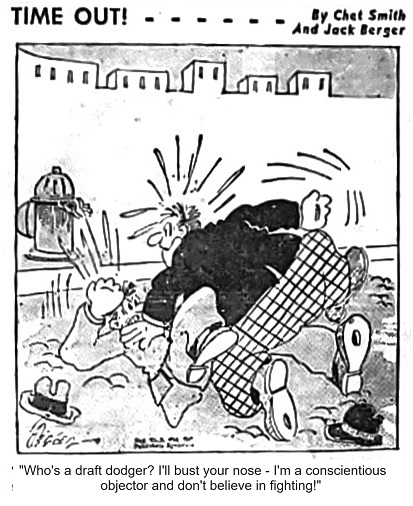
|
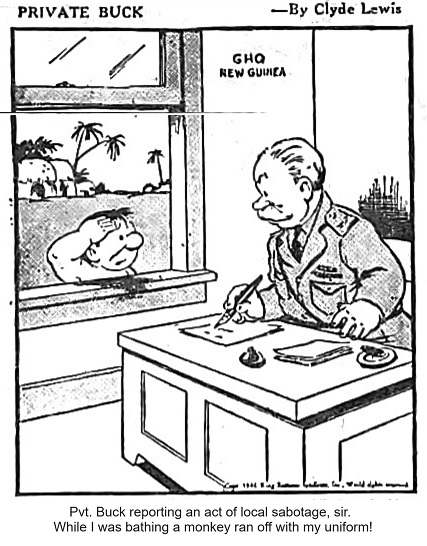
|
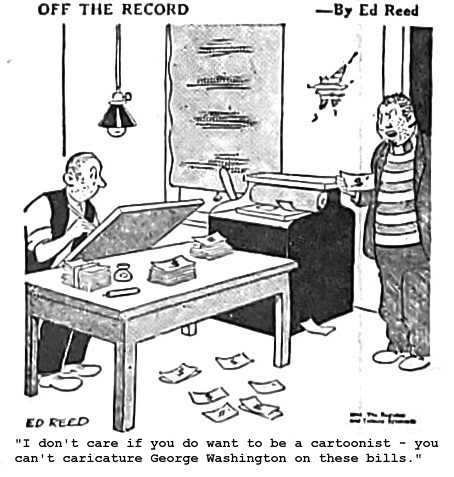
|
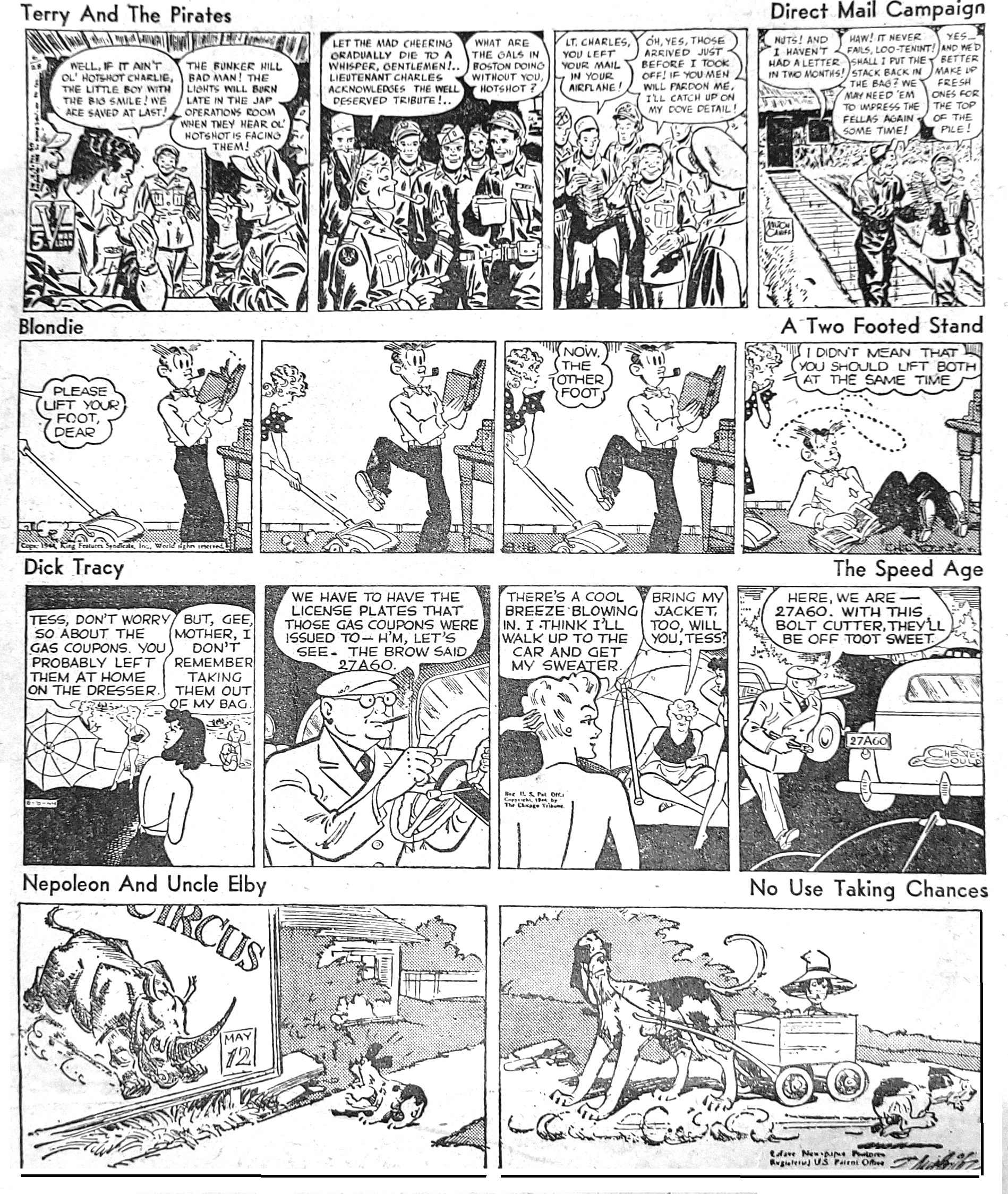
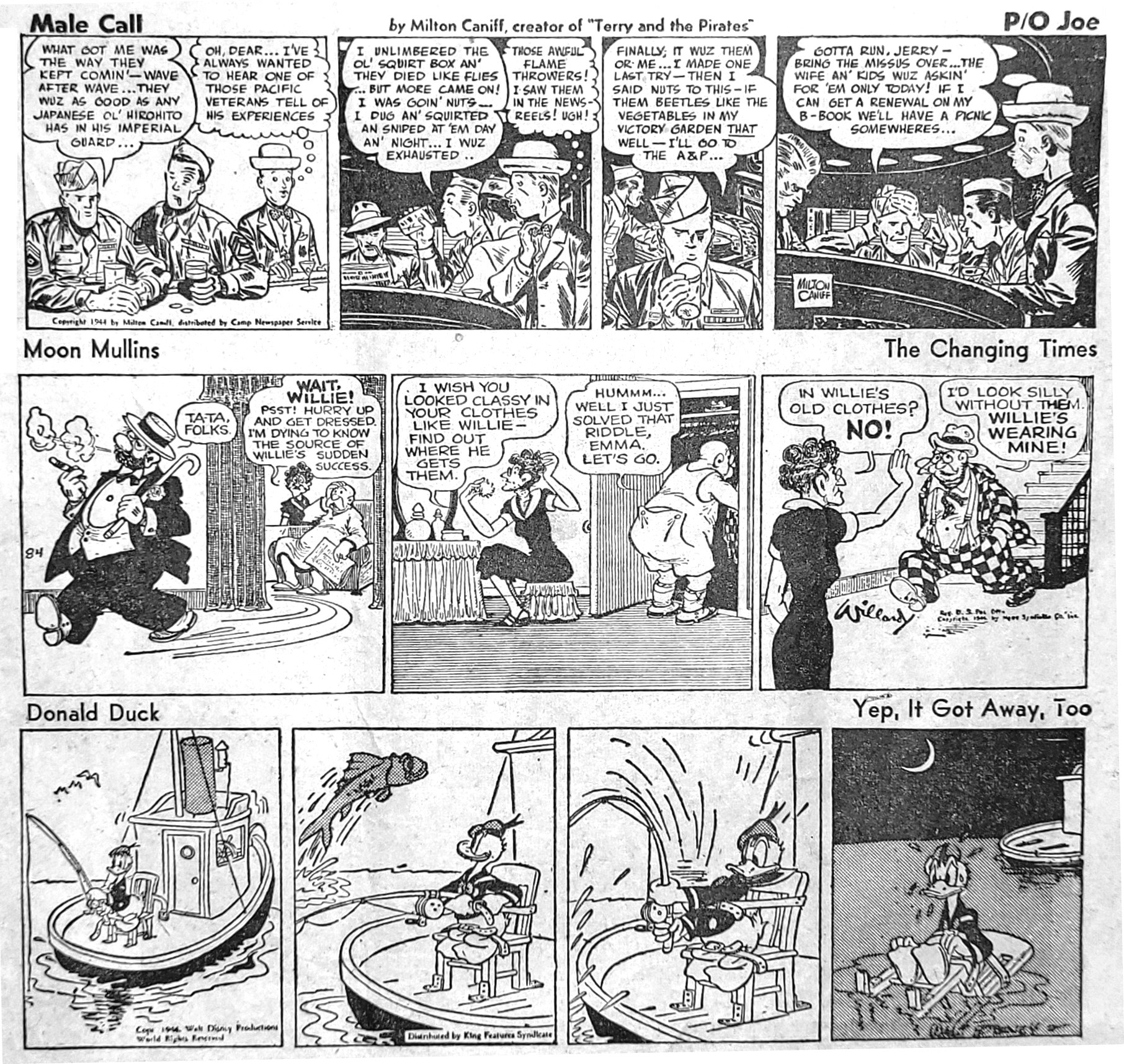

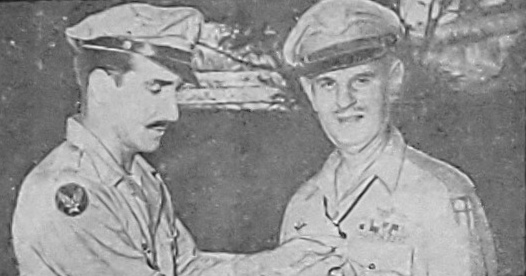 TURNABOUT IS FAIR PLAY
TURNABOUT IS FAIR PLAYMajor Verl D. Luehring, left, CO of the celebrated Twin Dragons P-38 unit, pins a miniature P-38 on the breast pocket of Major General George E. Stratemeyer, Air Commander, EAC, in token of the latter's honorary membership in the Cragon's Den, aptly named ooficers' club of the squadron. Just before he received the pin, Gen. Stratemeyer had presented decorations to eight of the squadron's pilots, including Major Luiehring who received a Silver Star. (USAAF photo) |
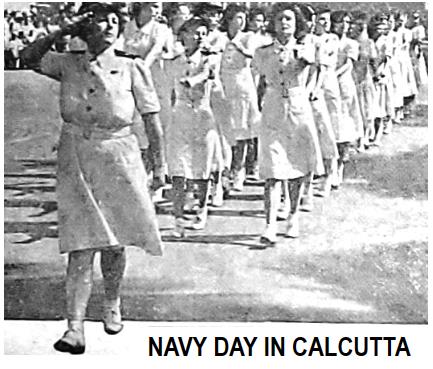
|
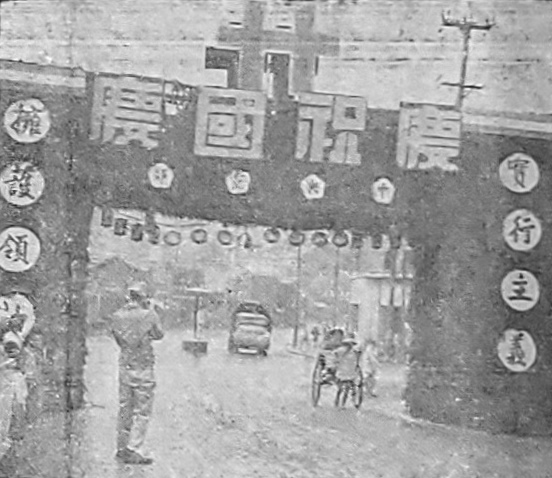 A GI IN CHUNGKING
A GI IN CHUNGKINGUnder one of the arches in Chungking, China, as a part of the festivities of the "Double-Ten" (tenth day of the tenth month, on an anniversary of the founding of the Chinese Republic) a GI takes a picture of another soldier from American Army Headquarters. (Signal Corps. photo) |
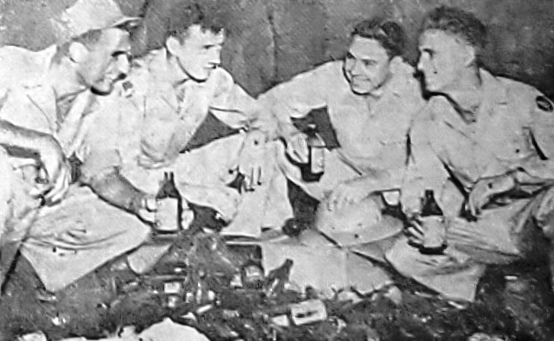 WHOOPIE, CBI STYLE
WHOOPIE, CBI STYLELiquid refreshment flowed freely last week as enlisted men at an India China Division ATC Base, celebrated the opening of their new recreation center. Sandwiches and beer or 'coke' took the place of a meal at the mess hall. Lef tto right are: Pvt. Bernard J. Santonocito, New York City; Pvt. James F. Boston, Roanoke, Va.; Pfc. Archie M. Welke, Woodlake, Neb. and Pvt. Michael W. Witucki, Buffalo, N.Y. (ATC photo) |
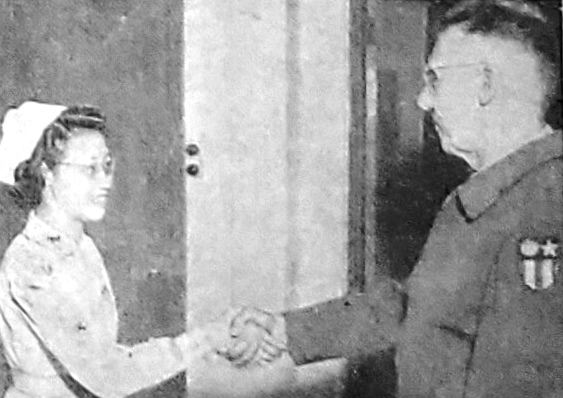 "FOR FAITHFUL SERVICE"
"FOR FAITHFUL SERVICE"Miss Annie Wah Lee, civilian nurse at American Army Headquarters in Chungking, being congratulated by Gen. Joseph W. Stilwell, Commanding General, USAF, CBI, following Miss Lee's decoration with the Award of thevEmblem for Civilian Service. Uncle Joe presented the award, which was "for satisfactory and faithful service to the United States Government during the period 13th April 1942 to 31st October 1944." (Signal Corps. photo) |
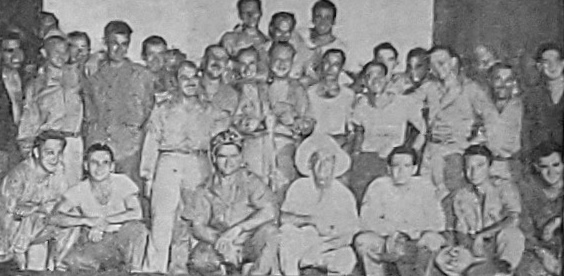 GIs AND SHOWFOLKS
GIs AND SHOWFOLKSGIs at Camp H joined performers of the USO show 99 for this picture taken when the traveling unit played at the camp last week. (Signal Corps. photo) |
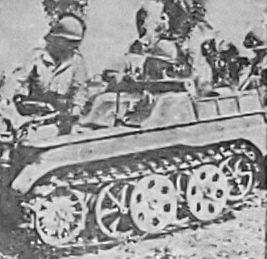 NAZI TRACTOR-JEEP
NAZI TRACTOR-JEEPAmerican soldiers inspecting a tractor-jeep which the Germans were forced to abandon under the pressure of superior U.S. forces on the French peninsula. |
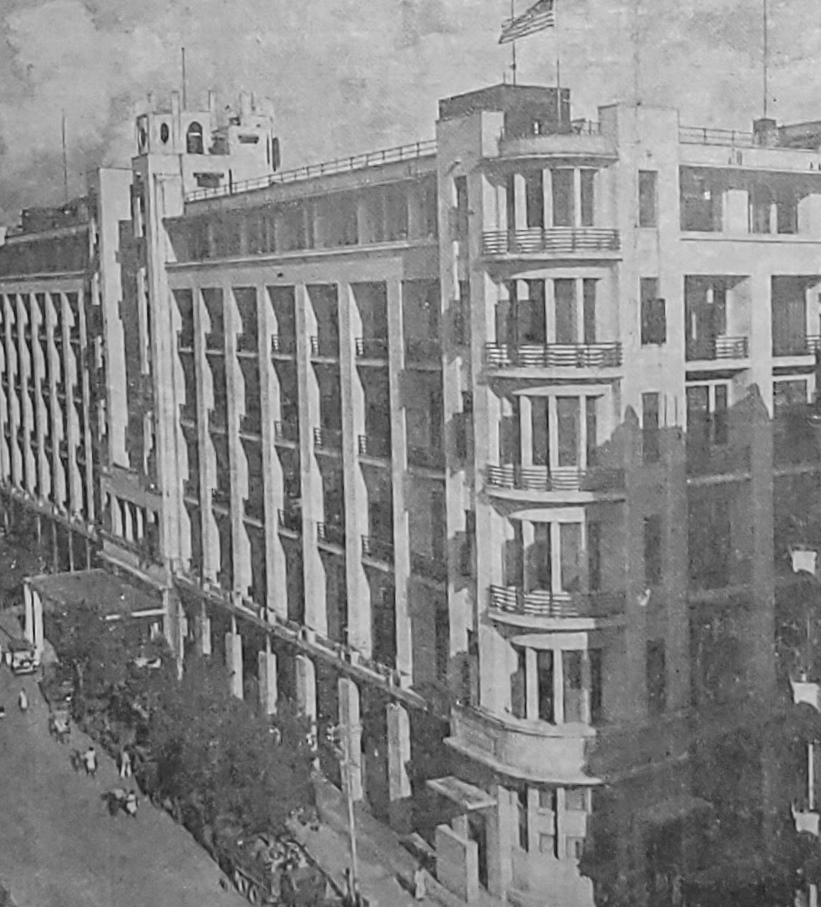 BASE SECTION CAPITAL
BASE SECTION CAPITALFirst published photographs of the building occupied by the Headquarters, Base Section 2, Calcuuta, from which is directed the greatest single supply operation in CBI. Construction of the building began by an Indian concern, had to be abandoned with the outbreak of the war. Later, the Army completed the unfinished framework in record time. (Signal Corps. photo) |
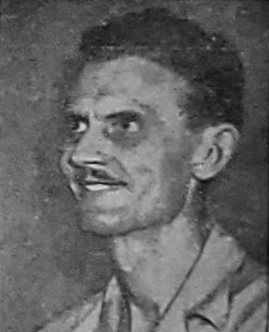 HONORED AND SHIPPED
HONORED AND SHIPPEDT/Sgt. Elmore "Tex" Wenderoth of the Hq. CBI - Air Service Command was packed and ready to depart for Uncle Sugar Able when he was awarded the Bronze Star Medal for meritorious service. He originated a system of material control which expedited the flow of ordnance supplies to forward areas at critical times. A native of San Antonio, Wenderoth has spent 28 of his 30 months in khaki in the CBI Theatre. (CBI-ASC photo) |
THE COMMAND POST. Published weekly by the Headquarters of Base Section 2 for military personnel only. Lt. Lester H. Geiss, Director, S/Sgt. Harry Purcell, Editor; S/Sgt. Jesse Sincere, circulation; Sgt. Maurice Pernod, news; Sgt. Bernard Cohen, drama; Pvt. Adolph A. Reibel, reporter. Printed at the "Patrika Press"

Vol. II No. 8 ~ OCTOBER 27, 1944
Adapted from the original issue of THE COMMAND POST
Copyright © 2023 Carl Warren Weidenburner
TOP OF PAGE ABOUT THIS PAGE E-MAIL YOUR COMMENTS CLOSE THIS WINDOW
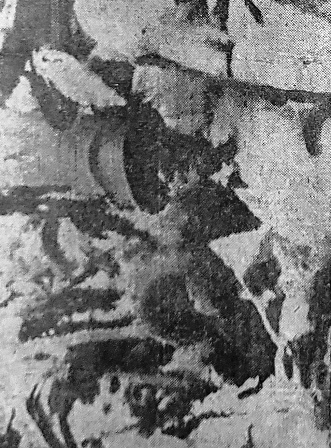 THE MAN WHO CAME BACK
THE MAN WHO CAME BACK 